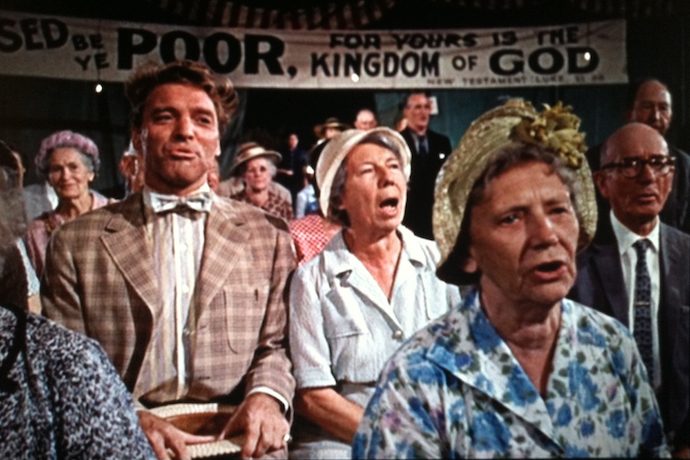Watching the GOP convention is like watching a bad sequel to Elmer Gantry. Written by Sinclair Lewis and later produced as a film starring Burt Lancaster and Jean Simmons (the actress, not KISS founder, Gene, aka Chaim Witz), Gantry served as Lewis’ satire of American revivalist religion.
A self-proclaimed preacher and healer given to alcoholic and sexual excess, Gantry preys on sincerely believing, unwitting people. After serving as the manager of a legit female preacher who dies in a conflagration (based on Aimee Semple McPherson), Gantry goes on to become a successful minister in his own church and a married family man. Lewis purportedly attended revivals several times a day before writing the book which was ultimately banned in Boston and excoriated from pulpits throughout the land.
The Trump GOP convention seems for all the world to be loosely orchestrated as an odd sort of tent revival. Its choreographers have put it together around the personal narratives of individuals who have suffered loss for one reason or another, ranging from undocumented immigration (Sabine Durden, whose son Dominic was killed by an unlicensed and undocumented driver, was described on the giant convention monitor as “Victim of Illegal Immigrants”), to casualties suffered at Benghazi.
These losses, though quite real, have nevertheless have been short on factual accuracy as to their causes. These narratives have further been buttressed by the individual witness born by adult members of the Trump family. (Note that such testimonials—essential to evangelical revivals—first became the stuff of which political conventions are made during Bill Clinton’s campaign. Just a bit of irony, not unlike that of plagiarizing Michelle Obama.)
As the convention has progressed the vilification and demonization of Hillary Clinton has gained in momentum and verbal violence, punctuated by calls to “lock her up” and that she “should be put in the firing line and shot for treason.” She definitely performs the role of Satan—”Lucifer,” as Ben Carson intimated—opposed by Trump whose role it is to save the country, to heal it. Gantry himself couldn’t have preached fierier hell and damnation sermons than those preached Chris Christie.

Guerrilla from the mist.
Perhaps the moment of supernatural splendor occurred Monday night as Trump the savior appeared out of a glowing mist as Freddy Mercury’s “We are the Champions” played in the background. (Mercury, a gay Zoroastrian, was born Farrokh Bulsara in Zanzibar.)
Trump then proceeded to give the briefest speech he has ever made, that of introducing his wife Melania, dressed in white, herself glowing as she told Michelle Obama’s her story. At moments Melania smiled graciously; at others she pouted in a weirdly erotic, kittenish sort of way—the stuff of which Aimee Semple McPherson’s performances were apparently made. To give credit where credit is due, however, Semple McPherson was not only quite sincere in her preaching, she actually provided her own material.
The Trump convention is trading on a long-standing religious tradition structured by a drama of salvation from a quite vividly conjured hellfire and damnation (Hillary Clinton, “secular progressives,” etc.), a healing of one’s suffering and loss, scripted—in his case—by the highly emotional testimonial, the one-on-one story. “I took Jesus as my savior; you take him too.” Of course Trump, like Gantry, is a fraud.
But my question concerns the nature of religious satire. Can one satirize oneself and camp followers without knowing it? Said slightly differently, does one have to intend satire in order for it to count as satire? Can anyone top Trump’s epiphany as he strode through the mist with “We Are the Champions” wafting in the background?





